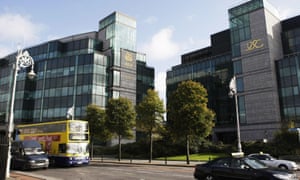
The Irish Financial Services centre in Dublin, one of four main alternative locations for financial firms alongside Frankfurt, Paris and Luxembourg. Photograph: Niall Carson/PA
Ireland has complained to the European commission that it is being undercut by rival centres competing to host financial firms looking for a base in the European Union outside London after Brexit.
Last week, the US insurer AIG became the biggest company so far to pick Luxembourg as its EU base, alarming Irish officials who fear that others may follow.
While the final terms for doing business with the EU from Britain are uncertain, finance executives say privately they expect Brexit to isolate London and want to establish bases inside the bloc from where they can access its single market. The four main alternative locations are Frankfurt, Paris, Dublin and Luxembourg.
AIG said its move was driven by Luxembourg’s proximity to its European clients and its role as a founder of the EU.
Eoghan Murphy, the minister in charge of promoting Dublin’s financial centre, described tactics by rival locations as “dangerous competition”. He told Reuters: “Other cities in Europe are being very aggressive in trying to win business.”
“We have always said … we would not be predatory … that we are not interested in brass-plating,” he said, referring to the practice of setting up a token operation with a brass plate sign outside in order to gain market access.
Although the EU wants to show a united front in negotiations with Britain, the dispute is testing this unity.
Murphy said he had raised concerns with Valdis Dombrovskis, one of the commission’s most senior officials, about “creeping regulatory arbitrage” – a reference to undercutting rivals by offering lax regulation. Although banks face strict supervision under the European Central Bank in the eurozone, there is no similarly powerful regulator for insurers and other financial companies.
The commission declined to comment on the complaint by the Irish but an official said it “will monitor any developments in this area closely”.
With final decisions on moves out of London still months away, the rivalry has become increasingly hostile, with some lobbyists for Frankfurt even said to be privately criticising the Irish accent. Nevertheless, Dublin has received 80 inquiries from banks to fund managers, according to IDA Ireland, the state agency that attracts foreign investment, while Ireland’s central bank has received five applications from insurers to set up shop.
While Murphy did not name Luxembourg, Irish officials said it was the location that had triggered the concerns.
“We are hearing from various sources that companies are being offered certain incentives,” said Murphy. “They are offering a back door to the single market, without the requirement to have capital to back up their entities in the EU.” Ireland’s central bank, wary of the risks in finance after the country was almost bankrupted by a financial crash, is making higher demands, officials and consultants said.
“Luxembourg does not appear to be requiring companies to set up substantial offices in order to establish an insurer,” said one senior insurance executive. This was disputed by Luxembourg’s finance ministry, which said it “is strongly committed to the highest standards in the supervision of the financial sector”.
A hard Brexit, in which Britain loses access to the EU’s single market, would wipe more than 4% off Irish exports, compared with 2.5% for Germany and 0.6% for Luxembourg, an Irish government-commissioned report showed. And such a hit for Ireland’s export-focused economy could cost about 40,000 jobs.
[“Source-theguardian”]
